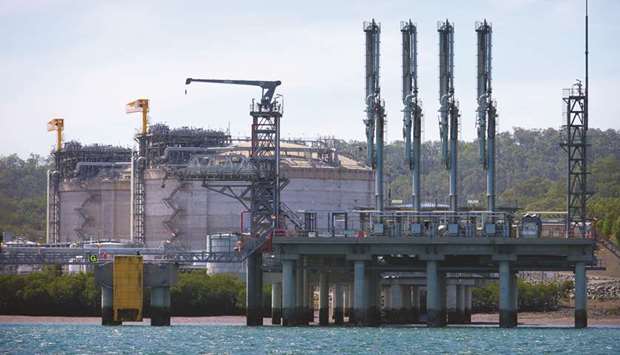Big Oil haunted by cost risks as $144bn LNG tab looms

Bloomberg/ Singapore
The world’s biggest energy companies are finally ready to invest in new gas export projects. Now they just need to figure out who will build them, and for how much.
After four years of belt-tightening, oil and gas firms are expected to start spending again, with as much as $144bn of investments in new liquefied natural gas developments in line to be approved by the end of this year. Meanwhile, the engineering, procurement and construction sector that erects these projects has been weakened by the cost-cutting, with shrinking order books and solvency questions.
While the order binge could provide a lifeline to EPC companies, it may see too many projects chasing too few builders, increasing risks for energy firms seeking to keep costs under control. In the last LNG building boom, for instance, projects in Australia alone went over budget by a combined $40bn.
“We have a new wave of LNG projects coming and a decimated construction sector,” said Saul Kavonic, an energy analyst at Credit Suisse Group AG. “There’s real risk as we go into this next wave that engineering and construction constraints mean a return of project delays and cost inflation.”
Natural gas is core to future growth for energy giants, with consumption seen growing faster than oil and coal as policies shift toward lower carbon emissions. Royal Dutch Shell Plc and Exxon Mobil Corp have in the past six months sanctioned new LNG plants in Canada and Texas, the first final investment decisions since 2015 for onshore greenfield projects. The amount of new production capacity investments this year could set a record, according to Wood Mackenzie Ltd.
That’s welcome news to oil and gas EPC companies, which have seen their order books dry up since the oil price crash in 2014. Six of the top publicly traded firms had a combined backlog of more than $120bn in 2014. That fell to about $66bn last year, according to filings from the companies, which now number five after an acquisition.
“The market has gone through a shake-up,” said Peter Coleman, chief executive officer of Australia’s Woodside Petroleum Ltd, which is planning an expansion at its Pluto LNG project. “Some people are still in balance sheet repair, and it hasn’t finished yet. We are watching that very closely.”
The sharpest pain is being felt by Chiyoda Corp and McDermott International Inc, which have suffered from cost overruns related to their work on the Cameron LNG project in Louisiana. Chiyoda in February requested financial aid from Mitsubishi Corp, its largest shareholder, and the company plans to be more selective when choosing future LNG projects and joint venture partners, Tomoyuki Tsukamoto, head of investor relations at Chiyoda, said by phone. McDermott declined to comment.
“We have to recognise that our workforce and our capacity are limited,” Tsukamoto said. “We have to select the most appropriate projects for us.”
A weaker construction sector will be good for the remaining EPC companies, as they’ll have more leverage when it comes to negotiating, said Kavonic. That will mark a reversal from the past few years, when spending cutbacks forced service and construction firms to slash margins and take on more risk to win a limited number of jobs.
While construction companies have worked to lower costs for customers, some energy firms anticipated those numbers would keep dropping, Bechtel Group Inc LNG General Manager Darren Mort said in a phone interview. As projects get closer to final investment decisions, companies are reining in those expectations for more appropriate pricing levels, he said.
“Some of the aggressive numbers don’t seem to be getting the traction that they thought they would,” Mort said. “If they really had some reality to them, we’d be seeing FIDs on that basis.”
San Francisco-based Bechtel is privately held, so its financial data aren’t as accessible as some competitors. The firm has avoided any recent high-profile construction problems and Mort said its finances and capabilities remain strong.
The earlier a company is able to start construction, the less chance that firms push for higher rates, Credit Suisse’s Kavonic said. Shell’s decision to go ahead with LNG Canada in October means the project, which will be built by Fluor Corp and JGC Corp, could be more competitive globally by missing any cost inflation, he said.“The faster projects FID, the better rates they’ll get from the EPC contractors,” said Fauziah Marzuki, an analyst with BloombergNEF in Singapore. “Once the contractors realise they’ll be a bit stretched, they’ll start to factor in bigger contingency costs and margins.
https://www.gulf-times.com/story/628787/Big-Oil-haunted-by-cost-risks-as-144bn-LNG-tab-loo